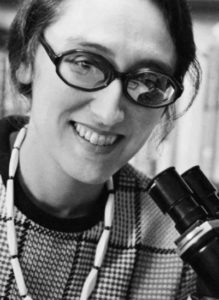The Rebel Evolutionist
 Lynn Petra Alexander (1938-2011) was born in Chicago to a prominent Jewish (and passionately-Zionist) family. She got accepted to the University of Chicago when she was just 15 years old, and graduated with a BA four years later. That same year, she married (former Jew of the Week) Carl Sagan, then on his way to becoming a world-renowned scientist himself. She then went to the University of Wisconsin and earned her Master’s in genetics and zoology, followed by a PhD from UC Berkeley. Around that time, she divorced Carl Sagan and later married another scientist, Thomas Margulis. Although she divorced him as well, she kept the last name and is best known today as Lynn Margulis. In 1966, she became a biology professor at the University of Boston and remained there until 1988, when she became Distinguished Professor of Biology and Geosciences at the University of Massachusetts. Her 1967 paper “On the Origin of Mitosing Cells” was initially rejected by fifteen journals and stirred a great deal of controversy before being confirmed experimentally in 1978. Much of her research (and the opposition to it) was based on demonstrating major flaws within Darwin’s evolutionary theory. She would say that “Natural selection eliminates and maybe maintains, but it doesn’t create.” Margulis offered one hypothesis of her own, endosymbiosis, now a widely-accepted theory in biology and a key mechanism of evolution. Margulis also co-authored the first paper on the now-famous Gaia hypothesis regarding the intricate interactions between living things and the planet. Margulis worked tirelessly to the last days of her life. She co-authored another big (and controversial) paper in 2009—at the age of 71! Margulis has been called a “scientific rebel” and won countless awards, including a National Medal of Science from President Bill Clinton and a NASA Public Service Award for Astrobiology. She also has 15 honourary doctorates and was elected to the National Academy of Sciences. In 2002, she was ranked among the 50 most important women in science.
Lynn Petra Alexander (1938-2011) was born in Chicago to a prominent Jewish (and passionately-Zionist) family. She got accepted to the University of Chicago when she was just 15 years old, and graduated with a BA four years later. That same year, she married (former Jew of the Week) Carl Sagan, then on his way to becoming a world-renowned scientist himself. She then went to the University of Wisconsin and earned her Master’s in genetics and zoology, followed by a PhD from UC Berkeley. Around that time, she divorced Carl Sagan and later married another scientist, Thomas Margulis. Although she divorced him as well, she kept the last name and is best known today as Lynn Margulis. In 1966, she became a biology professor at the University of Boston and remained there until 1988, when she became Distinguished Professor of Biology and Geosciences at the University of Massachusetts. Her 1967 paper “On the Origin of Mitosing Cells” was initially rejected by fifteen journals and stirred a great deal of controversy before being confirmed experimentally in 1978. Much of her research (and the opposition to it) was based on demonstrating major flaws within Darwin’s evolutionary theory. She would say that “Natural selection eliminates and maybe maintains, but it doesn’t create.” Margulis offered one hypothesis of her own, endosymbiosis, now a widely-accepted theory in biology and a key mechanism of evolution. Margulis also co-authored the first paper on the now-famous Gaia hypothesis regarding the intricate interactions between living things and the planet. Margulis worked tirelessly to the last days of her life. She co-authored another big (and controversial) paper in 2009—at the age of 71! Margulis has been called a “scientific rebel” and won countless awards, including a National Medal of Science from President Bill Clinton and a NASA Public Service Award for Astrobiology. She also has 15 honourary doctorates and was elected to the National Academy of Sciences. In 2002, she was ranked among the 50 most important women in science.
Words of the Week
We never judge a statement by its author, but only on its own merit.
– Rabbi Moshe Chaim Luzzatto (1707-1746), Derekh Tevunot
